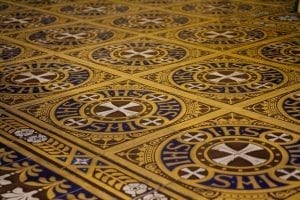Dear Friends,
Stories are very important. We each have our own story, which we need to tell and share in order to better understand why we are the way we are. In reading stories, whether real or fictional, we learn a little bit more about the world in which we live and a little bit more about ourselves. That is why I never tire of the Old Testaments stories, especially the Genesis story of Abraham.
Genesis, the book of beginnings, recounts the story of the great person of faith, Abraham. There is something for everyone and something of everyone, in that one story. It is a love story, Sarah; it is an adventure story, in the desert wanderings; but, most of all, it is the story of faith which begins with a feeling, a feeling that what we see, touch, possess, is not all that there is to life. That feeling leads to the journey of patience and deepening love which produces faith that is not afraid of the desert wilderness, or of the questions, that knows doubts, that makes sense of our wanderings. All in the great story of Abraham which the Sunday lectionary offers us as our reading, this summer.
It is the importance of our own stories that is behind the ‘Bricks without Straw’ material that was launched at Pentecost. This material is not designed to increase numbers or money; only love can do that, remembering always that God is love. The material is designed to help us as individuals, as congregations and as a Diocese to share our own stories. In sharing our own stories, then we can reflect and recognise where, when and how God is with us in our lives as individuals, congregations and as a Diocese. In Jesus, we see God as God really is, and in the story of Jesus all the great themes of human life weave together to prove, to me, the truth of Abraham’s feeling that there is more to life than what I can see, touch and possess.
The fact is, that in sharing our stories we begin to reflect and recognise the Holy Spirit active in our lives and in the lives of those around us. A part of the excellent children’s programme, ‘Godly Play’, used in some of our congregations, has a section after the story is told in which the participants are encouraged to ‘wonder.’ They are then encouraged to share their ‘wondering’. That is exactly what ‘Bricks without Straw’ aims to do to facilitate our wonderings and encourage each one of us to share our stories and our wonderings in ways that allow us to learn a little bit more about ourselves, a little bit more about other people and a little bit more about God.
There is always, understandably, a certain amount of cynicism about Diocesan initiatives. It may appear that more forms are to be filled in, or that the Diocese is checking up, or that the Bishop is acting as Pharaoh! And anyway, where is the Mission programme that will produce more people and more money? Such a programme does not exist: you cannot buy in a guaranteed magical method that will double congregations in a week and yes, it has been tried, and it has failed. That is why the cynic is the person who is determined never to be disappointed again.
Abraham was no cynic: he wandered in the wilderness of doubt and confusion but constantly he found oases of meaning and purpose, of hope, which encouraged the growth of faith and from the growth the flourishing. Flourishing of the Hope of being with God, of recognising God is with us, even especially in the wilderness, in the tomb itself which Jesus left behind to prove new life and light is ours, that is our story.
Growth and new life will come to us and our congregations in sharing our stories and in sharing God’s love and acceptance and welcome. The Scottish Episcopal Church has so much to offer through our liturgy and worship, through our social action programmes like food banks and other initiatives. In our facing the reality of climate change and in our rejoicing in exploring and celebrating the depth and breadth of human sexuality. All of which leads us to wonder at the excitement of life with God, which we know through understanding, acceptance and the peace of love felt in ourselves, in our congregations and in our Diocese and shared with all. I wish you all a very happy summer.
Yours in Christ
+ Kevin


